Low-Carbon Diet
Air Date: Week of March 14, 2008
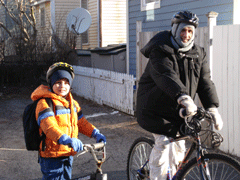
Jason and Miles Taylor set off for school the energy efficient way. (Photo: Helen Palmer)
A new twist on cutting carbs - slimming down your carbon footprint. Living on Earth's Helen Palmer reports on citizen efforts, including "The Low Carbon Diet", a program that can help your household reduce its carbon emissions by 5,000 pounds in 30 days.
Transcript
CURWOOD: There’s no national plan to cut America’s carbon footprint. But some citizens take the issue of reducing greenhouse gas emissions seriously – and throughout the country, there are initiatives to find ways to do just that. Living on Earth’s Helen Palmer reports on some businesses and ordinary people in eastern Massachusetts that are finding practical ways to live a greener lifestyle.
DILOIS: Welcome guys, welcome to Johnny D’s. My name’s Carla DiLois.
[CHEERS; PEOPLE SHOUT GO CARLA, GREEN MARTINIS!]
DILOIS: Anyone who offers a green martin’s is a friend, right?
PALMER: The scene is Johnny D’s, a music club in Davis Square, Somerville Mass. The green martinis are to celebrate local businesses going green. Johnny’s co-owner Carla DiLois:
DILOIS: We’ve done it for a few reasons. One cause it’s saving us a decent amount of money. I’ve calculated we’ve saved about 10 percent so far in the last six months that we’ve done it, of our energy costs. It’s pretty good.
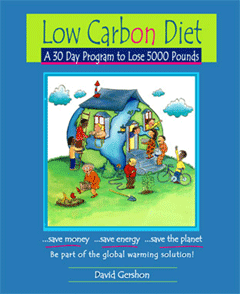
PARK: We’re really excited about that cause they’re made out of corn. We got rid of plastic in that sense, but then we realized that we actually were throwing a lot of cups away rather than what we were able to do before was recycle them, and we were like, this isn’t actually any better cause we’re throwing them away and they’re just going into landfills. So then we sort of started working with a company called Save That Stuff to look at composting and more recycling for our business.
PALMER: Park says overall it saves money – and wins loyalty from staff and customers. That’s part of the idea of Go Green Davis, says Seth Itscan. He owns a couple of web companies in the Square.
ITSCAN: What got this thing going was just sort of the vision of a carbon neutral Davis Square. And the idea that a whole part of a city, a whole business part of a city, could be carbon neutral – that’s obviously a big dream – but I think it’s an achievable dream, and this is the first step of it, is to get the business owners together and to talk about how they can save money while also saving the environment.
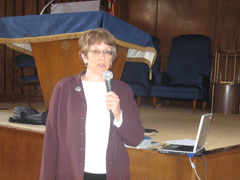
Susan Altman of the Massachusetts Climate Action Network introduces the Low Carbon diet to the congregation at Temple Shalom in Medford.
ALTMAN: It involves people in small groups getting together and helping each other and inspiring each other to do work that might otherwise not get done just because we’re all busy people and it’s very difficult to fit in yet one more little thing.
PALMER: Altman says the Low Carb Diet spreads from friend to friend. It comes with a book full of handy hints – ways to cut your personal carbon footprint by 5000 pounds over 30 days. Many of the ideas are familiar, like replacing those incandescent light bulbs, or remembering to take cloth bags to the grocery store. But Altman says this program works because it gives people a handy way of measuring.
ALTMAN: They march through this book and they write down, by doing this I lost – let’s see, an insulating blanket on your water heater. If you install one, credit yourself with 175 pounds of CO2 reduction annually. So you go through this, and you write down the number of pounds you lose, and every time you do it you get to see, ‘okay, that was 175 pounds, that was 50 pounds that was 450 pounds’ – before you know it you’re at 5000.
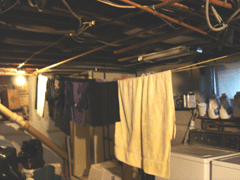
No more electric dryer – the Taylor family hangs the washing on an indoor clothes line. (Photo: Helen Palmer)
RUBIN: I’ve reduced my electricity use by 37 percent, but now I purchase renewable energy, so one could say I’ve reduced it by 100 percent. I’ve reduced my use of heating oil by 40 percent and I’ve reduced my use of gasoline by 71 percent.
PALMER: Rubin’s the director of Green Tourism for Boston. He spoke to a group of folks interested in signing up their friends to try the Low Carbon Diet. He says he made all these savings just by taking the kinds of actions detailed in the Low Carbon Diet book.
RUBIN: There’s no kind of learning that is better than actually making the changes yourself. There’s no kind of learning like figuring out, how do I reduce my own energy bill, and trying different things and seeing your usage go down.
PALMER: And when you see your usage go down, your bills go down, too. That’s a big selling point of the Low Carbon Diet.
PROKOSCH: Okay, so what do you think you spend on gas heat every year?
PALMER: Mike Prokosch is introducing the diet to a group of African-Americans and immigrants at a workshop in a church hall in Dorchester, Massachusetts.
PROKOSCH: Let’s start by looking at some low-cost ways to conserve energy. One of the biggest ways that we’re burning oil or gas is to heat water. How long do people spend in the shower in your household?
[WOMEN ANSWER ‘TOO LONG’; PROKOSCH LAUGHS]
PALMER: Set the kitchen timer and give the kids a five minute time limit in the shower, says Prokosch. Turn the thermostat down. Save energy by doing laundry in cold water.
[WOMAN SAYS ‘WE DO JUST ABOUT ALL OUR CLOTHES IN COLD WATER’; PEOPLE DISCUSS CLOTHES WASHING HABITS]
PALMER: The diet’s a hit with Cynthia Jarvis. She’s a single mother who’s originally from Antigua and works as a health aide.
JARVIS: This workshop is very interesting and you learn how to save energy and all them good stuff just to save some money in your pockets.
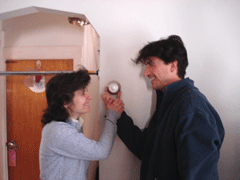
The thermostat wars - Jason Taylor and his wife Michelle Makarian. (Photo: Helen Palmer)
[DOORBELL; DOOR OPENING AND CLOSING]
WOMAN: Who is it?
PALMER: It’s Helen
MAN: Hi…
PALMER: One of my neighbors in Cambridge, contractor Jason Taylor, started the Low Carb Diet a couple of months ago.
TAYLOR: I’ve become a crazed thermostat watcher. And we’re in a constant battle, my wife and I – I turn it down, she turns it up – but still, I’m gaining on her.
PALMER: Jason says they wear sweaters, and they bought a new energy star refrigerator.
TAYLOR: If you want to come into my basement, I can show you we had… When we moved in here, there was already this clothes line – it was a clothes line, an indoor clothes line, and as you can see we use the…because apparently the biggest use of electricity is when you have an electric clothes drier. So long underwear is my other uh…I’ve got five pairs of long underwear now.
PALMER: Jason’s signed up his son, eight-year-old Miles, as well.
TAYLOR: Miles, how often do I take you to school on the bike?
MILES: Well we usually take the bike every day except when, like, it’s really, really icy or snowy.
TAYLOR: Right. You want to tell her about the re-charger, the battery re-charger we have?
MILES: Oh yeah, we have a solar battery re-charger out there.
TAYLOR: It’s really cool.
MILES: Yeah.
PALMER: Jason reckons he’s saved over 6,600 pounds of carbon so far. Susan Altman of the Massachusetts Climate Action Network says, over the last six months, thanks to the diet, the Bay State as a whole has cut its carbon dioxide emissions by about 305,000 pounds. It’s not much, compared with the 48 tons of CO2 that US coal-fired power plants emit every year – but more teams are signing on to go Low Carb every week, and every little bit helps.
For Living on Earth, I’m Helen Palmer in Cambridge.
CURWOOD: You too can get ahold of the Low Carbon Diet book, and find tips on how to lose 5,000 pounds in just 30 days. Details are on our website – L-O-E dot org.
Links
Living on Earth wants to hear from you!
Living on Earth
62 Calef Highway, Suite 212
Lee, NH 03861
Telephone: 617-287-4121
E-mail: comments@loe.org
Newsletter [Click here]
Donate to Living on Earth!
Living on Earth is an independent media program and relies entirely on contributions from listeners and institutions supporting public service. Please donate now to preserve an independent environmental voice.
NewsletterLiving on Earth offers a weekly delivery of the show's rundown to your mailbox. Sign up for our newsletter today!
 Sailors For The Sea: Be the change you want to sea.
Sailors For The Sea: Be the change you want to sea.
 The Grantham Foundation for the Protection of the Environment: Committed to protecting and improving the health of the global environment.
The Grantham Foundation for the Protection of the Environment: Committed to protecting and improving the health of the global environment.
 Contribute to Living on Earth and receive, as our gift to you, an archival print of one of Mark Seth Lender's extraordinary wildlife photographs. Follow the link to see Mark's current collection of photographs.
Contribute to Living on Earth and receive, as our gift to you, an archival print of one of Mark Seth Lender's extraordinary wildlife photographs. Follow the link to see Mark's current collection of photographs.
 Buy a signed copy of Mark Seth Lender's book Smeagull the Seagull & support Living on Earth
Buy a signed copy of Mark Seth Lender's book Smeagull the Seagull & support Living on Earth

